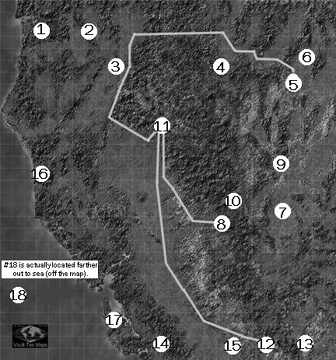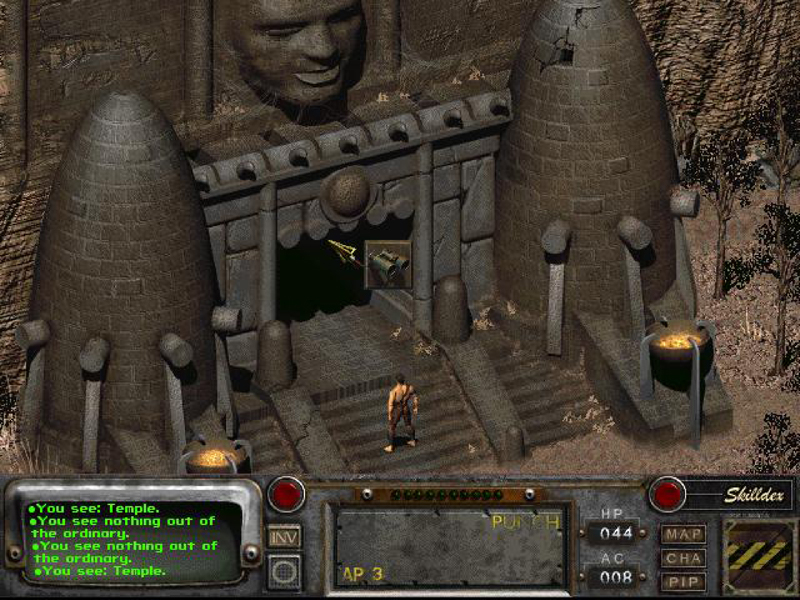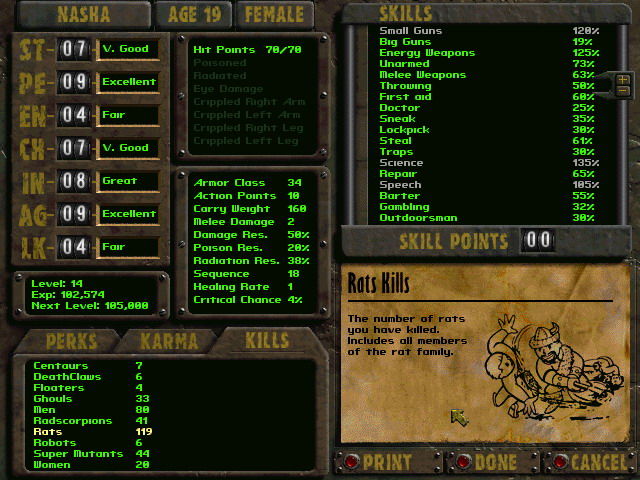Soma Drop: Fallout
Developer: Black Isle Studios
Publisher: Interplay
Release: 1997 (you can now find it on GOG)
In a world with no hope, you are asked to find water. Goddamnit, where are these people's priorities
let’s pretend
In my head, that is. On the board, I kept going around, around, and around. Silly square circles slowly circling silver symbols. Pass Go, collect $200. Go bankrupt, you lose. Game over.
But the game was over, for me, when my brother put hotels on Park Place and Dagobah (sue me for not remember the name of the cheap properties in the original game and subbing in the Star Wars version). The game was over for me when all I had were 2 flimsy $100 bills as I narrowly missed landing on Dagobah. That’s how I played games.
Selfishly.
in case of emergency, grip more tightly
Let’s blame the thimble, then. It wasn’t complex enough for me to invest in. I played selfishly because it was easy to play without sacrificing anything of my own. My ego was too big to fit into that thimble.
Not so with Fallout.
Overcoming Fallout with pure ego is an exercise in futility; not that it is too strong, too clever, or too quick to surround you, but because it is you. Fallout is a device, not simply a game. A game is more often a box we step into - one foot in, one foot out - watching the game as we play. But Fallout is a tool. Fallout is the means by which we experience a game that appears to be the only situation which this tool is devised for. If we wanted to play Fallout, we must use Fallout.
Ego must be subordinated to the tool. You can’t drive a screw with your pride; though you may be justified in being proud of your screwdriving. In games where rules abound, the mind and ego scheme; in situations where problems must be solved, mind and ego must develop tools to solve them. This is why Fallout succeeds in eliminating the ability to “stop playing” as long as you’re still…playing. Even in the face of overwhelming defeat, you must play.
you’re missing the point, I think
So there’s a story too, enveloping you within this game. Necessarily so, if we follow closely that rather convoluted mini-dissertation above. And envelop you it does, so fully, that you’re fully convinced that you, only you, could resolve it. Was it only by chance you were asked to retrieve a water chip to save your vault, and while playing lonely marauder came across some disheveled survivors of some strange horror? Their story (or deaths, you heartless bastard) leads you to an ever-apparent ever-unfolding conspiracy surrounding a monomer of a man (perhaps?), which seems to evoke a rather basketcase emotional salad of fear, reverence, anger, hope, acclamation, and disdain among those who have heard of him. Is it open-ended? In objective terms: no. And yet it’s crafted with such large space that it feels undeniably so.
We need to use our tool, our Fallout, as a means of traversing the story. Everyone in this game functions on rules in a box, including you. In the end it’s only way to make sense of the world.
It’s at this point that my feeble 13 year-old mind, having suffered from 3 days of stomach flu and sleep deprivation due to stomach flu, has an epiphany: the only way to beat this game is to play by the rules. If I die, my story ends. Everyone else’s story goes on. Harold lives even if I die. Maybe my vault dies, but that’s my fault too. I can’t play this game like I’m the only one that matters if I want to make a difference in this game. This game doesn’t care about me unless I make it care about me. It’s giving me ways to do it, but it’s not forcing anything on me. Am I the hero? I’m just trying to get a water chip, okay? I guess if I want more I’ll…have to do more.
That’s just the way the world works.
no handlebars, ma! oh shi—
If you completed the first game, you saw the critical success it received as justified. The financial success, even more so. It wouldn’t be too unsurprising to see a sequel. It would be even less surprising if the sequel were a near-carbon copy of the first. But it wasn’t. Fallout 2 was not the same game as Fallout.
Some of you might attribute this to the fact that the inspiration for Fallout was an even more expansive game known as Wasteland, which in turn was brilliant due to its depth based on the pen & paper game of the same name. This in turn will lead you assume that the brilliance of the original game is a result of its expanse, its openness, its space. That Fallout is marvelous because it is so freeing, so desolate, so…unbound. But you are wrong.


Those who created it expanded it, made it more free, with wider spaces and more possibilites. They too, like you, thought that what magic that made Wasteland and Fallout good was in fact the expanse, the liberty. But they were wrong too.
What made Fallout great was not the space. The space was simply the make, not the magic. The magic was the connection. Everything in Fallout matters to somebody. It isn’t always you. That’s what makes it great. It’s not about you. That’s why you’re free to do what you wish. You may be some kind of hero, but the hero you are not. Not unless you want to be. Not unless you try to be. You are a true stranger, a status which makes your achievement all the more meaningful when, and if, you choose to accomplish it. Fallout gave you the space to make it happen, but never ensured that you would. Fallout 2, and subsequently 3, failed in this respect.
To that end, Fallout had to make sure the world was sustainable without you, and to that end unwilling, or rather reluctant, to rely on you. You had to earn their trust, these game entities, and in some strange way the choices you made went from being simple binary to true choice. On top of that, events were never isolated, and reputation was written in your action, not only on your character sheet.
baby, you’ve got what it takes
Fallout doesn’t have to be the shining example of a bygone era. What it has, that quality of nous, of spirit, is still around. It’s what people experience everyday, in their connections with people.
Nobody forgets so easily, but they do eventually. Your past follows you, sometimes. Your records are written somewhere, but never whole hog. These truths can be quantified, programmed, and simulated. If ever there was going to be a sequel to Fallout, a true sequel, it wouldn’t even need to be set in a post-nuclear holocaust. A true Fallout sequel would be you, living your life, trying to save the world.
How’s THAT for a game.







